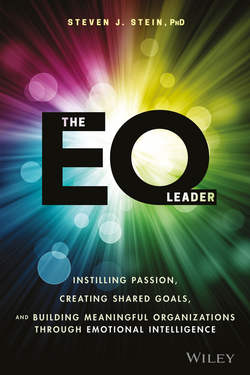Читать книгу The EQ Leader - Stein Steven J. - Страница 11
На сайте Литреса книга снята с продажи.
CHAPTER 1
LEADERSHIP
WHAT DO WE REALLY KNOW ABOUT LEADERSHIP?
Good Leader, Bad Leader
ОглавлениеOften when doing presentations on leadership I assign the audience an exercise. With participants working in small groups, each team is assigned one of two tasks. Each group is asked to write on a poster either the leadership characteristics most valued by their organization or the leadership characteristics least valued by their organization. On one of the posters, I found this list of descriptors:
Explosive
High ego
Always being right
Results driven
Ability to minimize ethical issues
Rigidity
No emotional control
Having serious “attitude”
I stopped to chat with the gentleman leading the group with these items on the board. When I started to ask how these behaviors were discouraged in his organization, he quickly corrected me and explained that these were the valued characteristics at the organization he and several others in the group had worked in. He then explained to me he had worked at Enron and that these were the characteristics valued by the senior team during the two years before it imploded.
We went through the list to see how these factors could be applied to leading an organization. Being explosive was a way of getting other people's attention. It also scared potential detractors and showed them you were serious. Most people would rather not confront someone in that state. Having a high ego is another tactic that implies you are right. After all, if you are so sure of yourself, well, why would anyone argue with that?
Always being right is a show of strength. If you are known around the organization as always being on the right side of an issue, then more people are likely to come onboard with you next time around. It reduces the amount of opposition you're likely to face and will help you win arguments more often than not. Being results driven is not an uncommon corporate position. The problem comes when nothing else matters. Treating people badly, taking shortcuts in processes, making promises you can't keep to customers, all these things are secondary to driving results.
The ability to minimize ethical issues is my favorite, especially when I'm presenting to lawyers and compliance officers. It sometimes gets referred to as ethical overrides. That is, you reward people for finding ways around codes of ethics, sometimes referred to as loopholes. So if I can justify why I needed corporate money for that private jet rental, luxury hotel, great meals, side trip with my family, and so on, everything is okay. I guess at Enron this only worked for a period of time, or until they got caught.
Being rigid is another way of telling people “it's my way or the highway,” something that seems to go over well in Texas, which conveniently is the home of Enron. Similarly, not having, or not displaying, emotional control is a fairly effective way to signal to others that one is not to be crossed/questioned. So is having strong attitude, which was described to me as being bold and assertive, in such a way that people knew not to question the leader's authority. This was described to me as a Texas attitude, which goes along with “don't mess with me.”
In looking at these traits it seems like they can be boiled down to being steadfast (high ego, always being right, results driven, rigidity, serious attitude) and being above questioning/criticism (no emotional control, ability to minimize serious issues, explosive).
It's hard to believe (at least for me) that companies can still operate this way in this day and age. Nevertheless, I've come across variations of this in my travels. Needless to say, some of these procedures can get you short-term results, but, as we've seen in this example, they don't seem to be viable long-term strategies. When I first started this work, it would often take a lot of convincing for some leaders to buy into the idea that managing emotions, for example, not using random anger to motivate, could be good for business. In the following chapters, we'll explore the case for emotionally intelligent leadership and what you can do to get there.
EQ Leader: Things to Think About
1. What were some of the best books you've read on leadership?
2. What did you like about them?
3. Are you familiar with a situation in which someone got promoted to a leadership position and was not well prepared for it?
4. Can you think of a “signature characteristic” that defines your current or a previous boss?
5. What would be the “ideal” signature strength of a leader you'd like to work for?
6. How would you want to be different from bosses you've had to work for?
7. What would be your signature characteristic as a leader?
8. Think about your own adaptability and willingness to change direction on important issues.
9. What do you think the signature strength of tomorrow's leaders will be?
EQ Leader: Actions You Can Take
1. Ask some of the people you work with for one-word descriptions of your boss.
2. Ask these same people what they would do differently if they were the leader.
3. Ask your coworkers about what they like best about their favorite leaders.
4. If you are a leader, ask some trusted subordinates how they would describe your leadership style.
5. Ask your subordinates what gets them most excited about their job. Then think about what role you play, as a leader, in cultivating their excitement.
